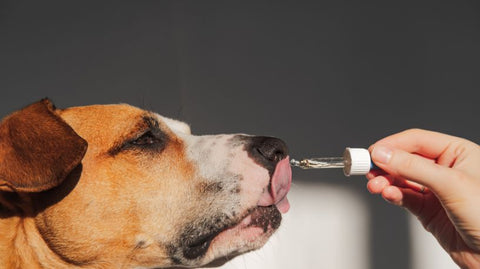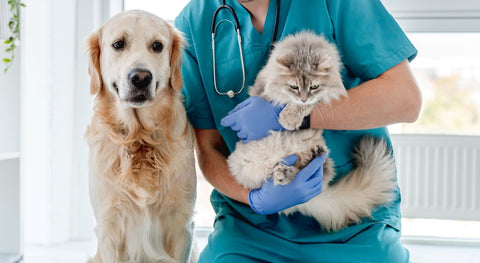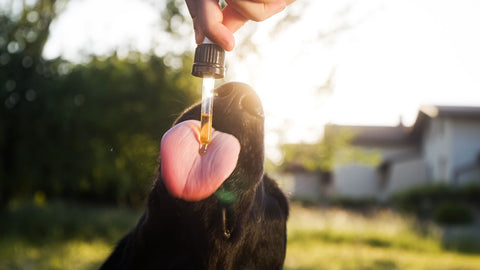

Key Highlights
- A healthy gut is crucial for your dog's overall well-being, impacting their digestion, immune system, and even behavior.
- Recognizing signs of gut issues early on, like vomiting, diarrhea, or changes in appetite, can prevent more serious health problems down the line.
- Diet plays a major role in gut health! Incorporating probiotic-rich foods, high-fiber options, and those rich in omega-3 fatty acids can significantly improve your dog's digestion.
- Always consult your vet before making major changes to your dog’s diet or if you suspect underlying health issues.
- Simple adjustments, like adding a dollop of yogurt or a sprinkle of pumpkin to your dog's food, can contribute to a happier, healthier gut.
Introduction
A balanced gut microbiome is very important for your dog's health. It helps absorb nutrients, supports a strong immune system, and affects their behavior and mood. To keep a healthy gut for your dog, you need to understand their specific diet needs and notice any problems early.
What are common digestive issues that can affect a dog's gut health?
Common digestive issues that can affect a dog's gut health include food intolerances, allergies, infections, parasites, and inflammatory conditions like gastritis or colitis. These issues can lead to symptoms such as diarrhea, vomiting, bloating, and discomfort in our furry friends.
Understanding Dog Gut Health
A dog's gut has millions of bacteria, both good and bad. This system is called the gut microbiome. It helps break down food, absorb nutrients, and fight off harmful germs. When a dog's gut microbiome is in good balance, it aids digestion, supports the immune system, and keeps them healthy.
Sadly, things like a bad diet, antibiotics, stress, and health problems can upset this balance. When that happens, it can cause digestive issues. But pet parents can do things to help their dog's gut bacteria. They can work to improve their pet's digestive health.
The Importance of a Healthy Gut Microbiome in Dogs
Maintaining good gut and immune health is very important for your dog's overall well-being. A healthy gut microbiome helps keep harmful bacteria away, which stops them from causing sickness.
In addition, a balanced gut supports the immune system. A big part of your dog’s immune system is in the gut, and a healthy gut microbiome helps it work well. This means better protection against infections, allergies, and other problems.
Taking care of your dog's gut health improves their energy and can help them live a longer, happier life.
Common Signs of Gut Health Issues in Dogs
As a good pet owner, you need to spot the signs of an unhappy gut in your dog. Some digestive issues are easy to notice, but others can be tricky. Pay attention to your dog's bowel movements. If you see diarrhea, constipation, or mucus in their stool, take note.
Vomiting, a lot of gas, bloating, and a shift in appetite can also show that there is a problem with the gut microbiome.
If you see any of these signs, especially when they last a while or come with other problems like lethargy or weight loss, talk to your veterinarian without delay.
articlebanners1
Key Foods for Enhancing Dog Gut Health
Diet is important for your dog's gut health, just like it is for humans. Adding the right foods can bring in good bacteria and feed the already existing good bacteria. This helps keep a healthy digestive tract.
When you give your dog a diet that supports their gut, you are helping them feel better overall. Always introduce new foods slowly. Talk to your vet to find the best diet for your dog's needs.
Probiotic-Rich Foods for Dogs
Probiotics are foods that have live bacteria. When you eat them, they add good bacteria to your gut. These good bacteria help push out bad bacteria and keep the gut microbiome balanced.
Adding probiotic-rich foods to your dog's diet can improve digestion, boost the immune system, and help with allergies.
Here are some safe and effective probiotic choices for dogs:
- Plain Yogurt: A spoonful of unsweetened plain yogurt can be a tasty treat with good probiotics. Make sure it doesn't have xylitol, which is harmful to dogs.
- Kefir: This is a fermented dairy drink, like yogurt, that has many beneficial bacteria. Again, ensure it’s xylitol-free.
- Sauerkraut: This fermented cabbage dish can be a good source of probiotics for dogs if given in small amounts.
High-Fiber Foods to Support Digestion
Fiber is important for helping your dog have regular bowel movements and to keep their digestive health in good shape. It acts like food for the good bacteria in your dog's gut.
Foods that are high in fiber can help create larger stools. This makes it easier for your dog to go to the bathroom and helps to stop constipation. They also help with nutrient absorption and support a healthy digestive tract.
Think about adding these high-fiber foods to your dog's meals:
- Pumpkin: Use canned pumpkin puree, not the pie filling. It is full of fiber and gentle on the stomach.
- Sweet Potatoes: Cooked and mashed sweet potatoes are tasty and have a lot of fiber.
- Apples: Remove the skin and cut apples into small pieces. They are a safe and healthy fiber choice.
Foods Rich in Omega-3 Fatty Acids for Inflammation Reduction
Omega-3 fatty acids are great for keeping your dog's gut health and overall health in good shape. They help with issues like inflammatory bowel disease and other digestive system problems.
When omega-3s reduce inflammation in the gut, they help your dog absorb nutrients better, keep a healthy gut lining, and support the growth of beneficial bacteria.
You can add these omega-3-rich foods to your dog's diet:
- Fish Oil: Salmon oil and other fish oils are great sources of omega-3 fatty acids.
- Flaxseed Oil: Ground flaxseed or flaxseed oil can be mixed into your dog's food for plant-based omega-3s.
- Chia Seeds: Chia seeds are rich in fiber and omega-3 fatty acids. Soak them in water before adding them to your dog's food.
Incorporating Healthy Foods into Your Dog’s Diet
Transitioning your dog to a new diet, like a raw food diet, that is better for their gut should take time. Start by adding a little bit of the new food to their usual meals. Slowly increase the amount as they get used to it.
Keep an eye on your dog for any changes in their digestion or behavior after you add new foods. If you see any bad reactions, stop giving them the new food and talk to your vet.
Balancing Commercial Dog Food with Gut-Healthy Additions
If you are giving your dog commercial dog food, you can add some gut-friendly ingredients to make their meals better and support a healthy microbiome. Just adding a spoon of plain yogurt, kefir, or pumpkin puree can make their food taste good. It also gives them beneficial bacteria and fiber.
To add more omega-3 fatty acids, put a teaspoon of fish oil or flaxseed oil in their food. You can also look for commercial dog food brands that have prebiotics and probiotics in them.
Don't forget to change the amount of food you give your dog so you do not overfeed them. Talk to your veterinarian for help in choosing the best dog food and adding healthy extras for your pet.
articlebanners2
Homemade Recipes for Improved Dog Intestinal Health
For those who like cooking for their dogs, homemade recipes let you choose the right ingredients for their gut health. When you make dog food at home, use whole and natural ingredients. These include lean meats, vegetables, and healthy fats.
Adding bone broth is also a great idea for homemade dog food. Bone broth is full of nutrients that help with gut health. You can easily make it by cooking bones, cartilage, and vegetables for a long time.
It’s very important to make sure that homemade dog food has all the nutrients that your dog needs. This varies by their age, breed, and how active they are. To create the best recipes for your dog, talk to a veterinary nutritionist.
Understanding Portion Sizes and Frequency
Feeding your dog the right amount and at the right time is very important. Choosing good dog food is not enough. If you overfeed your dog, it can gain weight and hurt its digestive system. If you underfeed, your dog might not get the nutrients it needs.
The right portion size and how often to feed can change based on your dog's age, breed, size, and how much exercise it gets. Puppies usually need to eat more often than older dogs.
Start by looking at the feeding guidelines on your dog food packaging. Then, talk to your veterinarian to find the best portion sizes and feeding schedule for your dog.
Avoiding Common Food Intolerances
Some foods can help your dog’s gut, but others can be harmful and should be avoided. Processed foods that are high in fat, sugar, and fake ingredients can upset the balance of gut bacteria. This can cause digestive problems and inflammation.
Also, table scraps might seem like a nice treat, but they can be hard for dogs to digest. Some ingredients in table scraps can even be toxic for them. To keep your dog's gut health strong, feed them a balanced diet with whole, unprocessed foods and stay away from bad treats.
Identifying Foods That Can Disrupt the Gut Biome
Certain foods can upset the balance of gut microbiota. This can lead to too much bad bacteria and cause digestive problems. Foods that are high in sugar and simple carbs can help harmful bacteria grow. This can result in inflammation and upset stomach.
Dogs can also have food intolerances and sensitivities. These can show up as vomiting, diarrhea, gas, bloating, and skin issues. Some common food allergens for dogs are beef, dairy, wheat, chicken, soy, and corn.
If you think your dog has a food intolerance, talk to your veterinarian. They can help you find and remove the harmful ingredient from your dog's diet.
The Impact of Processed Foods on Allergies and Digestive Health
Processed dog foods are easy to use but often do not provide the nutrients needed for good digestive health. Many of these foods have a lot of fillers, artificial ingredients, and preservatives. These can be hard for dogs to digest and may lead to bad bacteria growing in the gut.
The way kibble is made often uses high heat and processing that can take away important nutrients and enzymes.
Choosing fresh, whole foods when you can is a great way to help your dog's gut health and overall well-being.
Supplements and Treatments for Gut Health Recovery
In addition to changing your dog's diet, some supplements and treatments can help improve gut health. This is especially important after taking antibiotics or when dealing with digestive issues. Probiotics, prebiotics, and digestive enzymes can restore the right balance of bacteria in the gut. They also support better digestion.
Always talk to your veterinarian before giving your dog new supplements. They can recommend the right type and amount for your dog's needs.
Natural Supplements for Dog's Digestive Health
Natural supplements can help support a dog's digestive system. This is especially important when your dog is recovering from illness or has ongoing digestive issues. Probiotics, as mentioned before, add good bacteria to the gut. This helps bring back a healthy balance.
Prebiotics act like food for the good bacteria in your dog's gut. They help these bacteria grow and work better. Common prebiotics for dogs are FOS (fructooligosaccharides) and MOS (mannanoligosaccharides).
Digestive enzymes, like amylase, protease, and lipase, help break down food. This makes it easier for your dog to digest and absorb the nutrients.
When to Consider Probiotic Supplements
Adding probiotic-rich foods to your dog's diet is a great choice. However, sometimes a probiotic supplement is very helpful for balancing good bacteria in your dog’s gut microbiome. For instance, after using antibiotics, a probiotic supplement can help restore beneficial bacteria in the gut.
Dogs that have digestive issues, like diarrhea and constipation, can also gain from a probiotic supplement. This can help keep their bowel movements regular and support their digestive health.
Things like stress, travel, and changes in diet may upset the gut microbiome. In these situations, a probiotic supplement can reduce digestive problems and help maintain a healthy balance of gut bacteria.
The Role of Prebiotics in Gut Health
Prebiotics are very important for gut health. They provide food for the helpful microorganisms in your dog's digestive tract. These fibers are not digested in the small intestine. Instead, they travel to the large intestine and feed the good bacteria.
Good bacteria break down prebiotics through fermentation. This process helps them grow and work better. In return, this keeps a healthy balance of gut bacteria. A good balance is needed for proper digestion and overall well-being.
You can improve your dog's gut health by adding foods that are rich in prebiotics or by using a prebiotic supplement. These foods are usually high in fiber and can make a big difference for your dog.
articlebanners3
Monitoring Your Dog’s Gut Health Progress
Once you change your dog's diet or start them on supplements, keep an eye on their progress. Watch their bowel movements closely. Note how often they go, the consistency, and any odd smells.
Also, check for any changes in their energy, appetite, and mood. If you see good changes, it means the new diet or supplements are working. But if the problems continue or get worse, talk to your veterinarian to make sure there are no hidden health issues.
Signs of Improvement to Look For
A happy gut often means a happy dog! When you work on improving your dog's gut health, you can look for some signs that show your efforts are working. First, check their digestion. You should see regular bowel movements that are well-formed and without diarrhea or constipation.
Next, increased energy levels are a good sign that your dog's digestive system is doing well. You might notice them being more playful, alert, and interested in what is around them.
A healthy appetite is another good sign of a good digestive system. Your dog should be excited about their food and eat it all without problems. Lastly, you can look for a shiny coat and healthy skin. These show that your dog's gut health and overall health are in good shape.
When to Consult a Veterinarian
While you can often help with your dog's digestive symptoms using diet changes or natural supplements, it's important to see a vet if the symptoms don't go away, get worse, or come with other serious signs. If your dog has sudden or severe vomiting, diarrhea, bloody stool, tiredness, not eating, or losing a lot of weight, it is important to consult a veterinarian as soon as possible. As a responsible dog owner, it is crucial to prioritize your dog's health and seek professional help when needed.
Your vet can examine your dog closely and suggest tests to find out what is causing the digestive problems. They will guide you on the best treatment, which might include medicine, diet changes, or supplements, to meet your dog's needs.
Conclusion
Dog gut health is very important for your pet’s overall happiness. You can help their digestion by adding foods that are high in probiotics, fiber, and omega-3 fatty acids to their meals. It’s also important to avoid unhealthy foods and watch for changes in their health. A healthy gut leads to a happy dog. If you see any signs of digestive issues, talk to your veterinarian right away. Your dog's gut health is your responsibility, so make sure to nourish it well to keep them active and joyful!
Frequently Asked Questions
What Are the Signs of Poor Gut Health in Dogs?
Poor gut health in dogs can lead to several digestive issues. These can include vomiting, diarrhea, constipation, gas, bloating, and even weight loss.
How can I tell if my dog is experiencing digestive issues?
Watch for common digestive issues. These include bloating, vomiting, diarrhea, constipation, flatulence, and sudden weight loss. Food allergies and intolerances can also upset digestion.
articlebanners4




